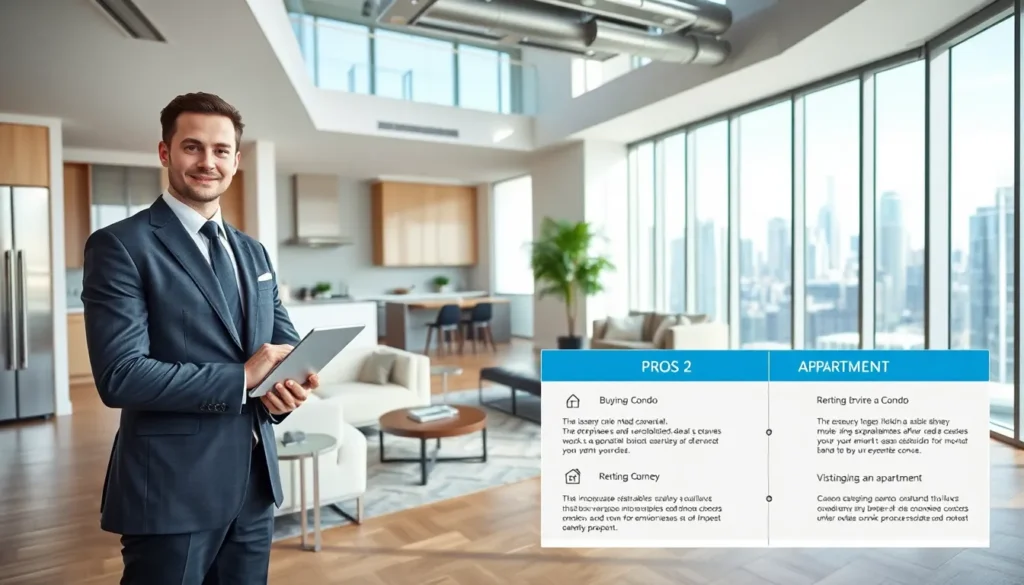Table of Contents
ToggleRenting a home can sometimes feel like navigating a maze, one minute you’re feeling like a savvy explorer with a map, and the next, you’re just as lost as a tourist in a foreign city without GPS. Fear not. This comprehensive guide to renting tips is here to help you decode the rental market, choose the right neighborhood, and ensure your landlord knows you exist (and likes you). Get comfortable, maybe grab your favorite snack, and let’s jump into the world of renting like a pro.
Understanding Your Rental Market

Researching Local Rental Trends
The first step in finding a suitable rental property is to understand local market trends. Are people flocking to your desired area, or are they giving it the side-eye? Websites like Zillow and Realtor.com can offer insights into average rental prices, as well as supply and demand. Checking recent listings can provide a snapshot of what amenities are standard and which aren’t. In many areas, demand can fluctuate seasonally, often peaking in spring and summer, so timing can affect your options.
Determining Your Budget
Budgeting remains a crucial aspect of the rental process. Generally, a rule of thumb suggests that your rent should not exceed 30% of your gross monthly income. Of course, everyone’s situation is unique. Take into account your other expenses, such as utilities, groceries, and that subscription to a streaming service you promised you’d cancel last month. Make sure to factor in potential rent increases, too. Understanding your financial limitations will eventually lead you to a rental that you can afford without living off ramen noodles.
Choosing the Right Neighborhood
Evaluating Amenities and Services
When selecting a neighborhood, amenities play a significant role. Walkable grocery stores, parks, and public transport can make life much easier. Consider what’s important for your lifestyle. Do you prefer the hustle and bustle of the city center, or are you looking for a quiet suburb with a coffee shop at every corner? Making a list of your must-haves and nice-to-haves can guide your neighborhood search effectively.
Safety and Security Considerations
Safety is a non-negotiable factor in any home search. Research crime rates in the neighborhood through resources like local police reports or online crime mapping services. Besides, spend some time walking around the area, either during the day or night, to gauge the level of comfort you feel. Inquire about the building’s security measures, and don’t hesitate to ask current tenants about their feelings on safety.
Navigating the Rental Process
Preparing Your Rental Application
A well-prepared rental application can set you apart from other potential tenants. Gather necessary documentation such as proof of income, references, and credit history. Landlords often receive many applications, so including a cover letter explaining why you would be a great tenant can give you the edge. Tailoring each application to the specific property can also show genuine interest.
Understanding Lease Agreements
Before signing on the dotted line, it’s essential to read the lease agreement thoroughly. Look out for hidden fees, lease durations, and rules about pets. Clarifying terms with your landlord can help avoid surprises or misunderstandings later on. If something sounds vague, don’t hesitate to ask for clarification.
Communicating With Landlords
Establishing Clear Expectations
Effective communication with your landlord can set the tone for a positive rental relationship. Clearly state your expectations right from the start. If you prefer a quick response to maintenance issues, make that known. A proactive approach can help ensure both parties feel satisfied in their roles.
Addressing Maintenance and Repairs
When minor maintenance issues arise, addressing them promptly is vital. Keep a log of any repairs needed and communicate them in writing to your landlord. This documentation serves both as a reminder for your landlord and as a record of requests made. Open communication can foster a partnership that could endear you to your landlord, making them more inclined to respond swiftly to your needs.
Maximizing Your Rental Experience
Personalizing Your Space
While you might not find yourself with ownership of the place, personalizing your rental can make it feel like home. Simple touches, like artwork, plants, or even rearranging furniture, can create a sense of belonging. Most landlords appreciate when renters take care of the property: just be sure to discuss any major alterations first.
Building a Good Relationship With Neighbors
Finally, fostering good relationships with your neighbors can enhance your rental experience. A friendly chat in the hallway or a shared cup of coffee can turn a cold, unfamiliar environment into a more welcoming home. Plus, having a great rapport with neighbors can provide you with valuable local tips and support.




